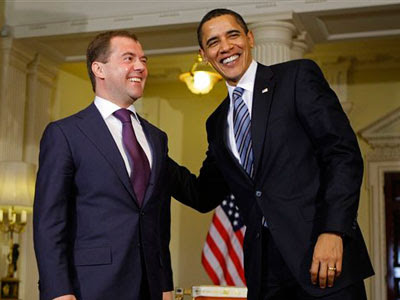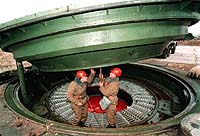Disarming America
by J. R. Nyquist
Weekly Column Published: 10.16.2009
Print As part of the next arms reduction treaty between superpowers, the United States has tentatively agreed to unprecedented Russian access to American nuclear missile sites. According to published accounts, Russian weapons inspectors will be given an open door to American nuclear sites in order to monitor the number of missiles and warheads. Russian Foreign Minister Sergei Lavrov is quite satisfied with the deal. Perhaps it is an error of omission, but there is no news of a similar concession from the Russian side. This is psychologically and strategically significant: first, because it presents us with a President and a Secretary of State who are mistaken in their assessment of Kremlin trustworthiness; second, because it shows weakness in the President; third, because the Russians are demonstrating a kind of superiority.
The leaders of the United States are unlike any previous leaders we’ve seen at the helm of a major power. Secretary of State Hillary Clinton recently made an extraordinary statement: “We want to ensure that every question that the Russian military or Russian government asks is answered.” And she means it. If a Russian foreign minister made a similar statement, one might expect to glimpse his colleagues suppressing giggles in the background. The America side makes such statements without the least cynicism, irony or humor. The U.S. Secretary of State is putting the concerns of her Russian colleagues first.
She is not putting the concerns of the American people first. This is at the core of the process. The strategic interest of the United States holds no place in the President's policy. Some greater good – or alleged greater good – is being promoted. You may call this greater good by the name of "world peace."
This state of affairs is even more peculiar when we consider Russia's declared war policy. On 13 October Reuters reported that Russia had publicly reserved to itself “the right to undertake a pre-emptive strike if it feels its security is endangered....” This was recently announced by a senior Kremlin official. Meanwhile, the United States is publicly renouncing its right to undertake a preemptive nuclear strike in turn. If the United States sees someone else preparing a strike, no preemptive action will be taken. Washington is resolved to accept the strike, and heaven knows whether we have the will to retaliate.
Now let us imagine, if we can, the United States making an announcement that we are prepared to initiate a preemptive nuclear war. Imagine the outcry from the media, from the liberal pundits, and from Europe. Such would rate as a political bombshell, denounced at home and decried abroad as provocative. So we find, as with every issue along the Left versus Right divide, that a double standard exists.
On the Russian side, provocative actions are acceptable. On the American side, they are deplorable. We must suspect that the Russians adopted their preemptive strike policy to reassure themselves, once again, that the Americans are guilty and timid creatures who are easily manipulated into concessions.
Under the present administration the policy is clear: The American side gives up one strategic advantage after another; and the Russians have come to expect these concessions. Logically, the Kremlin envisions a day when there is a final concession; a concession that cannot be revoked; a concession that is strategically decisive. Perhaps the arms reduction talks of today are approaching that point. Once the U.S. reduces its nuclear arsenal below 500 warheads – especially if those warheads are kept on submarines - a successful Russian preemptive attack becomes possible.
Many Americans will be puzzled by the analysis presented here. They do not see a threat from Russia. They see a threat from greedy corporate interests that allegedly own governments, like our own. I recently corresponded with a reader who described the market process of today as something that needs "to be put into the service of humanity...."
Such an imperative is socialist, and whatever faults we find in capitalism (and they are many), socialism is far worse. And those countries that lived under socialism during the Cold War are still suffering from despotism and backwardness. You can ask anyone who has lived in a socialist country versus an imperfectly free country, and only those who have swallowed socialist propaganda will champion the socialist system as a better way of life. An honest and sensible person, having lived under both systems, realizes what socialism signifies. Such people appreciate American power as the only thing that stands between the imperfect freedom that makes a decent life possible, and a perfect tyranny that hinders and constrains.
It is difficult for Americans to grasp the psychology of socialist leaders in the former Soviet Union. The American Left supposes that government is benevolent, that it can be controlled once it is given absolute control over the economy. They see the corruption of capitalism and are disgusted. They have yet, in their own country, to taste the corruption of absolute government power over human economic choice.
President Obama and Secretary of State Clinton treat with the Russians as though America was guilty of imperialist ambition and trickery. They give Russian military experts unprecedented access to U.S. missile sites. Could it be, having sat in the Trinity United Church of Christ, listening to Rev. Jeremiah Wright calling God's wrath down on America, that Barack Obama is unconsciously setting up our nuclear destruction?
Copyright © 2009 Jeffrey R. Nyquist





 Reply With Quote
Reply With Quote










 Russia and the US reached an outline arms agreement in July
Russia and the US reached an outline arms agreement in July
 It is confusing that Start and Sort run concurrently
It is confusing that Start and Sort run concurrently 


Bookmarks